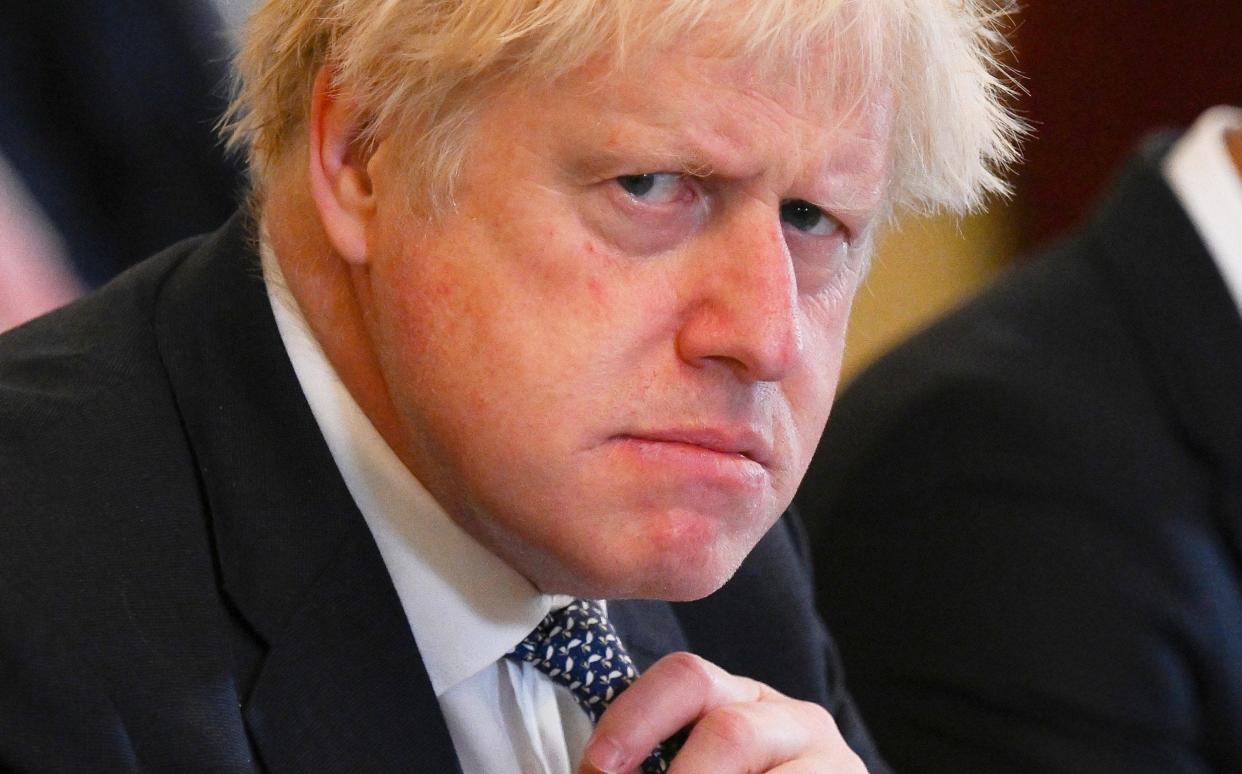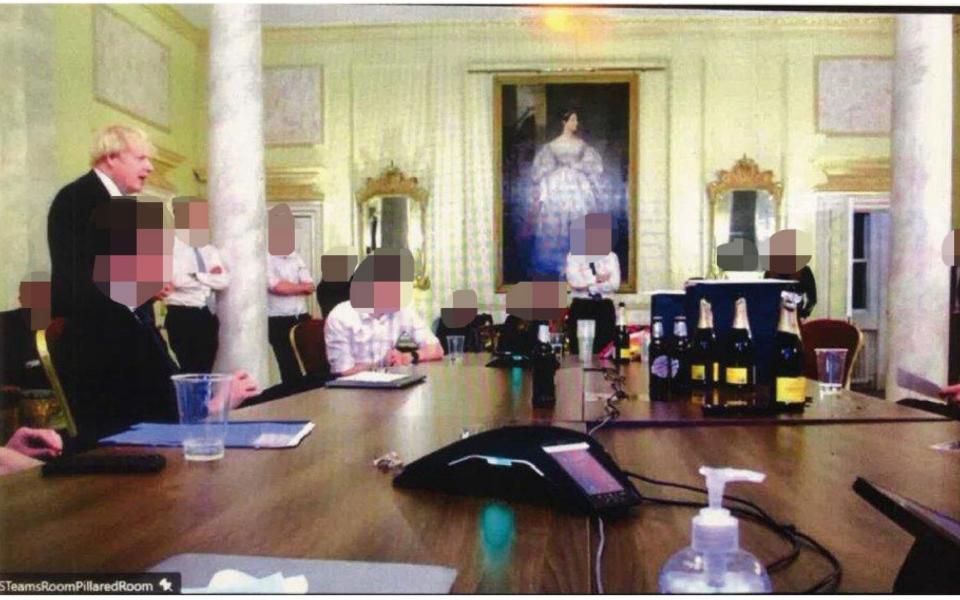Boris Johnson partygate: Key questions answered, from the dossier to what sanctions he could face

- Oops!Something went wrong.Please try again later.
Boris Johnson faces a grilling over partygate on Wednesday that could ultimately make or break the rest of his political career.
He is to appear before the Privileges Committee for up to four hours as he fields questions from a seven-strong group of senior MPs, who will determine whether he deliberately misled Parliament over what he knew about Downing Street gatherings.
Here, The Telegraph takes a look at what lies ahead for Mr Johnson, his “bombshell” defence dossier, and the possible consequences if the committee rules against him.
Why is Boris Johnson facing an investigation?
Boris Johnson is under investigation by the House of Commons’ Privileges Committee after he was accused of making a misleading statement to MPs on four separate occasions over partygate.
Mr Johnson had categorically insisted no rules were broken in Parliament amid the scandal over lockdown-breaking gatherings.
He eventually corrected the record in the Commons after he received a fine over a “birthday party” event he attended in the Cabinet Room on June 19, 2020, but continues to deny any deliberate wrongdoing.
It is now up to the Committee to determine whether he “knowingly or recklessly” misled MPs.
On December 8, Mr Johnson apologised “unreservedly” and insisted “there was no party” after footage emerged of Allegra Stratton, his former spokesman, joking about a Christmas party during a mock press conference.
On Jan 12 2022, as he spoke in the Commons, Mr Johnson apologised for attending a gathering on May 20, 2020 – which he was not fined over – and added: “I believed implicitly that this was a work event.”
Downing Street confirmed in April 2022 that Boris Johnson and his wife Carrie, as well as Rishi Sunak, his then-chancellor, had each received a police fine.
On June 14 2022, after the publication of Sue Gray’s report and the conclusion of a Metropolitan Police investigation, Harriet Harman was announced as the chairman of a Privileges Committee inquiry to establish whether Mr Johnson intentionally misled Parliament through his denials of any deliberate wrongdoing.
Earlier this month, an interim Privileges Committee report contained a new photograph of Mr Johnson at a social event during the third lockdown. The report said there was evidence he misled Parliament through his remarks in the Commons, but Mr Johnson insisted there was no smoking gun and that he would be “vindicated” by the work of the Committee.

What is in Boris Johnson’s defence dossier?
Mr Johnson is preparing to unveil “bombshell” evidence he believes will clear his name, including messages from his advisers, sent before he spoke in Parliament, advising him no Covid rules had been broken in Number 10. It was expected to be published as soon as Monday, but is now expected today.
A source close to his defence team told The Telegraph that the dossier contains “new evidence that helps his case” and “documentary evidence” that will show he had received the reassurances he has spoken about in the Commons.
The Telegraph understands his team will produce WhatsApp messages and other “internal comms” from the time which show that the then-prime minister’s statement was based on what he had been told by Downing Street aides.
In a submission containing dozens of pages, the lawyers will outline assurances Mr Johnson was given as well as arguing the Privileges Committee has overturned decades of tradition by deciding it needs to prove he “recklessly”, instead of “deliberately”, misled the House – something that has a lower bar to prove.
When is the hearing and what can we expect?
Mr Johnson’s appearance before the Privileges Committee is scheduled for 2pm on Wednesday March 22. It is expected to last from two to four hours.
The evidence session will be televised and is likely to be one of the most-watched parliamentary hearings in recent history.
Under current plans that are yet to be finalised, Harriet Harman will deliver the opening remarks. Mr Johnson will then give an opening statement of his own, before the MPs on the Committee take it in turns to ask him questions.
The former prime minister will have to take an oath towards the start of the session, which will effectively amount to a promise that he will tell the truth in his responses.
Lord Pannick KC, one of Britain’s best-known barristers, is heading up Mr Johnson’s defence and will be sitting by his side, but he will not be able to give evidence directly for his client.
Who are the Committee members?
The Committee is cross-party and made up of seven MPs. It has a Conservative majority, with four Tory members, alongside two Labour MPs and an SNP MP.
Ms Harman, a stalwart of the New Labour years and a former acting leader of the party, has been drafted in as acting Committee chairman after Sir Chris Bryant recused himself from the inquiry over his public comments about partygate.
The other Labour MP is Yvonne Fovargue, a backbencher who previously held shadow ministerial posts under Jeremy Corbyn and Ed Miliband.
The four Tory MPs are Alberto Costa, a trained solicitor who has never had a ministerial role; Sir Charles Walker, a veteran backbencher who urged Mr Johnson to resign over partygate; Sir Bernard Jenkin, an MP of 31 years who has developed a reputation as a steely but respected inquisitor in his position as chairman of the Liaison Committee; and Andy Carter, a member of the Red Wall intake elected at the 2019 general election.
What happens if the Committee finds Mr Johnson misled Parliament?
If the Privileges Committee found Mr Johnson “knowingly or recklessly” misled MPs over partygate, it could recommend a series of sanctions.
These could include suspending Mr Johnson from the House. If he were to be suspended for more than 10 days, this would trigger a recall petition and ultimately lead to a by-election.
Any sanction issued by the Privileges Committee will be subject to a vote of all MPs in the Commons. The Government has confirmed it will allow Tory backbenchers a free vote.
Speaking to Camilla Tominey, The Telegraph’s Associate Editor, on her GB News political programme, Oliver Dowden, the Chancellor of the Duchy of Lancaster, said: “Having worked with Boris for many years in different capacities, I’m quite sure that he will put forward a very robust defence of his case when he appears before the Committee on Wednesday.
“First of all it will be for the Committee to make a determination, and if that necessitates it going to the floor of the House, it will be up to each individual MP to make up their mind.
“As I say, I think he’ll make a robust defence. We are following the usual precedent though in saying this is a matter for the House of Commons.”

